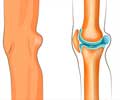People who go for knee replacement surgery tend to gain weight after the operation, according to a University of Delaware study.
Researchers Joseph Zeni and Lynn Snyder-Mackler found that patients typically drop weight in the first few weeks after total knee arthroplasty (TKA).But later, the number on the scale starts creeping upward, with an average weight gain of 14 pounds in two years.
The research involved 106 individuals with end-stage osteoarthritis who had knee replacement surgery, and an age-matched, healthy control group of 31 subjects who did not have surgery.
Height, weight, quadriceps strength, and self-perceived functional ability were measured during an initial visit to UD's Physical Therapy Clinic, and at a follow-up visit two years later.
"We saw a significant increase in body mass index (BMI) over two years for the surgical group, but not the control group. Sixty-six percent of the people in the surgical group gained weight over the two years-the average weight gain was 14 pounds," said Zeni.
Those who had the knee replacement surgery started out heavier and ended heavier than the control group.
Advertisement
"These findings are making us re-think the component after total knee surgery and of patients not being in a routine of moving around," said Snyder-Mackler.
Advertisement
Gaining weight after one knee replacement is worrisome because it could jeopardize the patient's other knee.
Between 35-50 percent will have surgery on the other side within 10 years, said Snyder-Mackler.
The researchers noted that weight gain after a knee replacement needs to be treated as a separate concern and integrated into post-operative care through a combination of approaches, including nutritional counselling to help patients with portion control, and more emphasis on retraining patients with new knees to walk normally.
The study has been published in the latest online edition of Osteoarthritis and Cartilage, the official journal of the Osteoarthritis Research Society International.
Source-ANI
TAN










